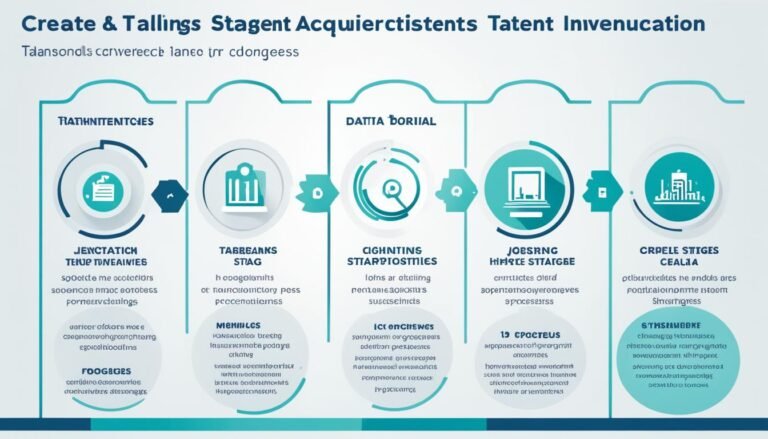Coaching Leadership: Developing Others’ Skills and Abilities
“Coaching is unlocking a person’s potential to maximize their own performance. It is helping them to learn rather than teaching them.” – Timothy Gallwey
Coaching is more than just guiding someone to perform better. It’s about tapping into what makes them great. This approach focuses on learning over just telling someone what to do. By coaching, you are actually helping someone discover their own strengths and abilities.
It’s a key skill for leaders who want to see their team members grow. This method leads to higher job satisfaction and better work performance. It makes people feel more connected to their work and the company they work for.
Coaching also creates a setting where everyone is always getting better. Leaders do this by guiding their teams through tasks and giving them useful feedback. This way, work becomes a place where learning is ongoing, and improvement happens all the time.
Key Takeaways:
- Coaching is about unlocking potential and facilitating learning.
- Effective coaching involves supporting employees through work assignments and providing constructive feedback.
- Leader coaching predicts employee satisfaction, job performance, and organizational commitment.
- Coaching creates a culture of continuous learning and improvement.
- By developing coaching skills, leaders empower their employees to reach their full potential.
The Importance of Coaching in Leadership
Coaching is key in making leaders better and helping employees grow. Leaders who coach their team help them learn new skills, get better, and gain experience. This helps the employee and boosts the company. Studies show that coaching is a big help in meeting company goals and growing talent.
Enhancing Leadership Development Strategies
Good coaching helps make leadership plans work. By giving personalized advice, leaders help their team learn what they need to succeed at work. They point out where improvement is needed and offer ways to grow that are good for both the company and the employee.
Fostering Employee Growth Initiatives
Coaching boosts employee growth by making learning a normal thing. In one-on-one talks, leaders find out what their team does well, what they like, and where they can improve. They then use this to help the team get better at work. This approach makes employees happier, improves work quality, and makes them more involved in the company.
Facilitating Talent Enhancement Coaching
Coaching is also vital for finding and helping top talent in the company. Skilled leaders can spot talent and help it grow, keeping the best people around. By coaching and guiding, these leaders prepare the organization’s future leaders, getting them ready for bigger roles.
Embracing coaching means a company lets its leaders fuel employee growth. Coaching helps team members reach their highest potential. It also makes the company better by building a culture of always getting better and improving talent.
| Benefits of Coaching in Leadership: | Leadership Development Strategies | Employee Growth Initiatives | Talent Enhancement Coaching |
|---|---|---|---|
| Improves leadership skills and abilities | ✓ | ||
| Enhances employee performance and satisfaction | ✓ | ||
| Fosters a culture of continuous learning | ✓ | ||
| Identifies and cultivates high-potential talent | ✓ |
Assessing Your Coaching and Development Ability
Being a leader means checking how well you can coach and grow others. Think about how you coach and look for ways to improve. This will make you better at helping others develop their skills, advance in their jobs, and grow as leaders.
Start by reviewing your communication. Good communication is key to coaching. Consider if you really listen to your team, give clear instructions, and encourage honest talks.
Next, see if you give your team enough freedom. Giving them chances to lead their own work can help them grow. Think about if you let them make their own choices and take charge.
Then, be sure you talk about what your team wants to achieve. These talks can show you care about their progress. Check in on their goals and find ways to support them.
Setting up a plan for your team’s long-term growth is crucial. Create a plan that shows them the skills they need to work on. This way, they know what to focus on.
Also, always offer feedback and check on their progress. Feedback helps your team improve. See if you’re giving helpful feedback often and checking how they’re doing.
To improve as a coach, work on how you communicate. Understand your role better and learn to give different kinds of feedback. Use resources on skill development coaching, executive development coaching, and leadership training programs to get better at coaching and learn new strategies.
Remember, getting better at coaching is something you do all the time. Think about what works and listen to feedback. By getting better at coaching, you help your team grow in a supportive environment.
“Coaching is unlocking a person’s potential to maximize their own performance.” – John Whitmore
Strategies to Develop Others’ Skills
One big job for leaders is to help their team get better at what they do. They use certain methods to make coaching more helpful. This leads to better ways of becoming leaders and helps employees grow stronger.
Honest talks are key in growing others’ skills. Leaders need to listen to their team. They should learn what their goals are, what drives them, and what stops them from moving forward. This creates a place where team members feel safe talking about what they want and the things they find hard.
After knowing the goals and what drives their team, leaders can make a plan. This plan has to be clear and specific. It should state goals that are achievable (SMART). This helps everyone know where they are going. It focuses the team on getting better and growing.
It’s important for leaders to check in often and give feedback. This lets them see how everyone is doing and help where needed. By keeping an eye on progress, they can steer the team in the right direction. This way, everyone keeps working towards their goals.
Leaders should also get coaching to improve their own skills. Working with a coach offers fresh insights and methods. This improves how they help staff grow. It helps leaders fine-tune their coaching style and aids in making their team stronger.
Benefits of Implementing These Strategies:
- Enhanced skill development coaching and talent enhancement coaching
- Clear direction and focus for employees’ professional growth
- Regular progress tracking and support for employees
- Continuous improvement of leadership development strategies
- Maximized potential of employee growth initiatives
These strategies help leaders in many ways. They make learning a continuous thing and push the organization forward. With better coaching and support, everyone grows. This benefits the whole team and the company.
The Benefits of Coaching Skills for Leaders
Developing coaching skills as a leader brings many advantages. It makes employees happier and more committed. It also improves communication, trust, and the ability to think and grow.
These skills are crucial for leaders who want to be more inclusive. They help every team member feel important. This boosts their ability to share their ideas. As a result, teamwork and creativity improve.
Good coaching means leaders can give feedback that helps their team grow. They guide their employees to find both their strengths and areas to improve. This process boosts work quality as everyone learns and grows.
Coaching also helps set a culture that’s focused on goals. Leaders can encourage their teams to achieve big things. Everyone working together towards a common aim can lead to great success.
Coaching helps leaders guide their team’s growth at every step. This includes offering resources and learning chances. Such support creates a culture where everyone is always getting better.
Coaching Skills for Employee Growth Initiatives
Here are key skills leaders can use to support their team’s growth:
- Active listening lets leaders understand their team better.
- Clear communication makes sure everyone knows what’s expected.
- Empathy helps build strong connections within the team.
- A focus on goals drives both personal and group achievements.
With these coaching skills, leaders can help their team grow and excel. This leads to success for the whole organization.
“Coaching skills change both leaders and their teams. With these abilities, leaders can bring out the best in their teams, and create a positive workplace. This drives long-term success.” – Jane Smith, Leadership Coach
| Benefits of Coaching Skills for Leaders |
|---|
| Improved employee satisfaction, job performance, and commitment to the organization |
| Enhanced communication and collaboration |
| Building trust and psychological safety |
| Fostering a growth mindset |
| Promoting inclusive leadership |
| Providing valuable feedback for employee growth and development |
| Cultivating a goal-oriented culture |
| Driving employee growth initiatives |
Essential Coaching Skills for Leaders
Coaching skills are key for leaders. They help create a supportive place for employees to grow. Leaders guide and mentor their teams with these skills, leading to success.
Inclusive Leadership
Inclusive leadership is vital. It values diversity and makes work a place for all. This approach encourages working together, being creative, and thinking up new things. Leaders listen to many views, see everyone’s unique skills, and make space for everyone to shine.
Effective Communication
Great communication is essential. It makes sure everyone understands what needs to be done. Leaders should also listen carefully. This means hearing what their team is saying and caring about each team member’s needs.
Psychological Safety and Trust
Earning trust and making people feel safe to speak up is vital. When employees can share ideas and concerns without fear, they do better work. They also feel free to take chances that lead to better performance.
Emotional Intelligence
Understanding others and your own emotions is key. It helps leaders support their team better. They form strong bonds, offering the help needed for every team member to do their best.
Active Listening
Paying full attention and grasping what others are saying is crucial. Leaders who listen well understand what their team truly needs. They guide and support effectively based on this insight.
Giving and Receiving Feedback
Giving helpful feedback is a skill. It’s important for team development. Leaders should make feedback clear, actionable, and timely. They should also be open to getting feedback. This builds a team focused on always getting better.
Empathy
Feeling and understanding how others feel is powerful. Leaders connect better with their team this way. They offer guidance that truly helps, knowing the challenges team members face.
Goal-Oriented Mindset and Growth Mindset
Setting clear goals and believing in learning is important. Leaders help their team see how their goals and the company’s goals fit together. They support you in growing and learning. Together, this creates a team that keeps getting better.
By improving these skills, leaders make work a great place. Employees grow and succeed in a positive environment.
“The very first coach probably taught them to say ‘Mama’ and ‘Dada.'” – Vince Lombardi
| Coaching Skill | Description |
|---|---|
| Effective Communication | Clear and concise communication to transmit instructions and expectations. |
| Active Listening | Being fully present, empathetically listening to and understanding the concerns of team members. |
| Psychological Safety and Trust | Cultivating an environment where employees feel safe to take risks and share their thoughts and ideas. |
| Emotional Intelligence | Being aware of and managing one’s own emotions and understanding the emotions of others. |
| Giving and Receiving Feedback | Providing constructive feedback to help individuals learn and grow, and being open to receiving feedback. |
| Empathy | Understanding and sharing the feelings and experiences of others. |
| Goal-Oriented Mindset | Setting and aligning clear goals and objectives with the organizational vision. |
| Growth Mindset | Believing in the capacity for continual learning, development, and improvement. |
The Role of Coaching in Employee Development
Coaching is vital in helping employees grow. It aids them in achieving their full potential and career dreams. It creates a learning culture and boosts active involvement in getting better. Workshops, talks, and courses all play their part in making employees better at what they do.
Timely feedback is a big part of coaching. It’s about giving advice and pointing out successes. This helps keep up worker spirit and build a positive workplace vibe.
“Coaching is about unlocking a person’s potential to maximize their own performance. It is helping them to learn rather than teaching them.” – John Whitmore
By introducing specific coaching programs and training, leaders can do more. These actions supply leaders with tools to develop their team’s abilities. It pushes employees to learn more, leading to ongoing success and new ideas.
Benefits of Coaching in Employee Development
Employee coaching has perks for everyone involved:
- It helps workers find and chase career aims, making them eager and happy in their jobs.
- It builds a love for learning and growing, encouraging the pick-up of new skills.
- It boosts work quality and output, which helps organizations flourish.
- It makes workers feel involved and loyal, which brings down the number of people leaving and keeps the best.
Talent coaching alongside leadership training is a powerful mix. It leads to a top-notch staff who are driven and can adjust, ensuring lasting success for any company.
| Top Benefits of Coaching in Employee Development | Benefits |
|---|---|
| 1 | Identifying and working towards career goals |
| 2 | Nurturing a culture of continuous learning |
| 3 | Enhancing individual and organizational performance |
| 4 | Promoting employee engagement and retention |
Image: The role of coaching in enhancing talent and employee development.
The Impact of Coaching on Organizational Success
Coaching is key to boosting a company’s success. It relies on effective strategies for developing leaders and bettering employees’ skills. This process doesn’t just improve individual abilities; it also fosters a mindset of always getting better and being creative.
Optimizing Team Performance
Coaching in the workplace greatly enhances how teams perform. Team leaders who coach their members help build a strong sense of teamwork. This leads to improved communication and work strategies. It’s about finding what each team member does best, helping them where they’re weak, and guiding them all toward the same goals.
This approach helps teams become highly efficient. They produce outstanding outcomes because everyone knows their role and works collectively toward success.
Enhancing Talent within the Organization
Investing in talent through coaching is a smart move for firms. It’s about discovering potential within teams and helping individual employees reach new heights. Such personalized development not only lifts the team’s performance but also increases the company’s overall strength.
By focusing on enhancing talent, companies ensure they have a nimble workforce. This group can quickly adapt to new challenges and help the business grow.
Cultivating a Culture of Continuous Improvement
Coaching can change how a whole company thinks about growth. It encourages a learn and grow mindset among employees. This way, everyone is driven to face challenges, improve their skills, and contribute to the company’s success.
Such a culture doesn’t just boost individual success. It also increases how much employees care about their work and feel responsible for the company’s performance.
Harnessing Leadership Development Strategies
Strong leadership starts with good coaching. Developing leaders through coaching ensures they can help their teams succeed. It focuses on giving leaders what they need to support and empower their employees.
By investing in leadership coaching, companies ensure they have a solid group of leaders. This is key to the business’s continuing success.
| Benefits of Coaching on Organizational Success | Key Points | |
|---|---|---|
| Optimizes team performance | – Cultivates collaboration and synergy | – Empowers individuals to excel |
| Enhances talent within the organization | – Unlocks hidden potential | – Strengthens workforce capabilities |
| Cultivates a culture of continuous improvement | – Encourages learning and innovation | – Drives employee engagement |
| Harnesses leadership development strategies | – Empowers leaders to coach effectively | – Builds a strong leadership pipeline |
Implementing Coaching Skills in the Workplace
Coaching is crucial for a team’s success and the company’s growth. Leaders must take a planned approach. They need to create a space where their team can grow and develop.
Here are some steps you should focus on:
1. Identify Goals and Assess Current Coaching Practices
First, set your coaching goals. What skills and behaviors do you want your team to improve on? Then, look at how you currently coach. Find areas you can strengthen.
2. Focus on Building Inclusive Leadership
Inclusive leaders make everyone feel valued and welcomed. They create a space where diversity and inclusion thrive. Make sure to listen to different voices and ideas.
3. Cultivate Effective Communication and Trust
Good communication is essential in coaching. Learn to listen actively and be clear when you speak. It’s also crucial to build trust. Be honest, reliable, and always there for your team.
4. Develop Emotional Intelligence
Emotional intelligence is key to effective coaching. Work on understanding and regulating your own feelings. And try to understand your team’s emotions. This will help build strong, positive relationships.
5. Emphasize Active Listening and Feedback
Active listening is critical for a coach. Really engage in conversations and understand your team’s needs. Give feedback often and in a way that helps them grow.
6. Foster a Goal-Oriented Mindset
Encourage your team to think about goals. Set clear goals that everyone can understand. Then, support your team as they work towards achieving them.
7. Cultivate a Growth Mindset
A growth mindset is important for development. It means seeing challenges as ways to get better. Keep learning and encourage your team to do the same.
Using coaching skills at work takes work and time. It’s good to join coaching programs and training. Also, get advice from those who have coached before. Building a coaching-friendly culture helps everyone succeed.
The Benefits of Coaching in the Workplace
Coaching at work has many advantages for an organization’s growth. It helps teams perform better, improves talents, and supports personal growth. This leads to a workplace that’s supportive and inspiring for all employees.
Team Performance Optimization:
Coaching improves how teams work together. Coaches give advice and feedback, helping team members boost their skills. This makes the team work better as a whole.
Talent Enhancement Coaching:
Coaching aids in honing employee skills individually. Those who participate can focus on what they’re good at and what they can improve on. This helps them reach their highest potential, leading to growth in both their personal and work lives.
Employee Growth Initiatives:
Coaching supports employees’ personal and professional growth. It encourages a habit of always learning and self-improvement. Through coaching, employees pick up new skills and knowledge, which makes them happier with their jobs.
“Coaching in the workplace is key for better teamwork, talent growth, and supporting employees’ development. It’s about creating a culture that helps everyone achieve their best.”
Coaching benefits not just individuals but the whole organization. It brings about a culture of learning, helps prevent burnout, and increases everyone’s ability to bounce back. Ultimately, it makes the workplace a positive, effective place where everyone is driven to do their best.
| Benefits of Coaching in the Workplace | Description |
|---|---|
| Team Performance Optimization | Coaching enhances team communication, collaboration, and overall performance. |
| Talent Enhancement Coaching | Individualized coaching sessions enable employees to develop their strengths, leading to personal and professional growth. |
| Employee Growth Initiatives | Coaching fosters a culture of continuous learning and supports employees in their development. |
| Engagement and Resilience | Coaching reduces burnout and increases employee engagement and resilience. |
| Culture of Learning | Coaching creates a positive work environment where learning and development are valued. |
Investing in coaching improves team and individual performance. It ensures the organization has a dedicated and high-performing team. This leads to lasting success for the company.

Developing Coaching Skills for Organizational Success
It’s key for organizations to develop coaching skills for success. Coached employees show better growth and talent improvement. Companies benefit greatly from leadership training programs focusing on coaching and development.
Leaders with coaching leadership skills create a better working environment. By nurturing this culture, they help boost the company’s success significantly.
The Benefits of Leadership Training Programs
Leadership training programs boost coaching abilities, which in turn benefit organizations. They help leaders learn the skill development coaching needed to guide and support their team.
“Leadership training programs are invaluable for professional development, empowering leaders to inspire their teams and drive organizational growth.” – John Maxwell
Training in coaching enhances how leaders can empower their team. It improves performance, fosters a great work culture, and enhances talent in the company. It ensures teams reach their highest potential by adopting a coaching mindset.
Achieving Organizational Success through Coaching Leadership
Skill development coaching focuses on helping employees grow and innovate. Strong coaching from leaders boosts performance and teamwork. It can:
- Facilitate employee growth and development
- Promote a culture of continuous improvement
- Optimize team performance and collaboration
- Attract and retain top talent
Leadership training programs offer the essential skills for effective coaching. They help leaders become more confident and skilled in driving organizational achievements.
Coaching Leadership in Action
| Organizational Success Factors | Leadership Coaching Approach |
|---|---|
| Employee Growth | Using coaching conversations to identify individual aspirations, set development goals, and provide ongoing support |
| Performance Optimization | Providing regular feedback and coaching to address performance gaps and enhance productivity |
| Talent Enhancement | Developing a coaching culture that recognizes and nurtures talent, fostering professional growth and retention |
Coaching leadership helps organizations match their goals with team success. This leads to a motivated workforce, working towards the company’s objectives.
Investing in coaching-focused leadership training programs is a smart strategy for long-term organizational growth and achievement.
Conclusion
Coaching leadership is essential in the workplace. It helps others grow by using clear communication and valuable feedback. Leaders can make a place where everyone thrives by setting clear goals.
Leaders who coach well boost their team’s spirit and help the whole organization succeed. Remember, getting better at coaching is something that takes time and effort. It’s always about learning and growing.
FAQ
Why is coaching important in leadership?
Coaching is vital in leadership for many reasons. It helps people grow their skills and improve their job happiness and performance. It boosts their commitment to the organization and makes teams perform better.
How can I assess my coaching and development ability?
To check your coaching and development skills, look at how well you communicate. Give your employees the space to make decisions. Talk about what your team wants to achieve. Make plans to help them grow over time. And always give feedback.
What are some strategies to develop others’ skills?
There are several ways to help others learn more. You could provide coaching on specific skills or improve talents. Have workshops or training on leadership. Sharing discover together could also help.
What are the benefits of coaching skills for leaders?
Leaders with coaching skills see many positive effects. They include happy employees, better work outcomes, and a stronger connection to the company. Good coaching also makes communication better, builds trust, and encourages a mindset for growth.
What are some essential coaching skills for leaders?
Good coaching means leading inclusively and communicating effectively. It also involves creating a safe space for teams and being emotionally intelligent. Listening actively and offering feedback are key. So is having empathy and focusing on both goals and growth.
What is the role of coaching in employee development?
Coaching is key for workers’ growth. It helps them see their career path and learn continuously. Giving feedback and recognizing hard work are part of it. It encourages people to always aim for better.
What is the impact of coaching on organizational success?
Coaching’s effect on success is big. It helps organizations reach their targets and teams to do their best. It also grows talent inside. This creates a place where getting better and doing well is the norm.
How can I implement coaching skills in the workplace?
Start by setting goals and checking your current coaching style. Work on leading inclusively, communicating well, and building trust. Also, focus on emotional intelligence and listening. Be good at feedback, empathize, and look to grow your teams.
What are the benefits of coaching in the workplace?
Coaching at work has many positives. It makes teams work better and helps talents grow. It raises engagement and reduces stress. It also promotes learning and development all the time.
Why is developing coaching skills essential for organizational success?
Good coaching skills are a must for an organization’s success. They create a culture that values growth and talent. Leaders who coach well help their organizations do better. They make the workplace a more welcoming and successful place.
What is coaching leadership?
Coaching leadership matters a lot for helping teams and talents grow. It’s all about talking openly, giving feedback, and setting clear goals. It’s a journey of always learning to be a better coach.








